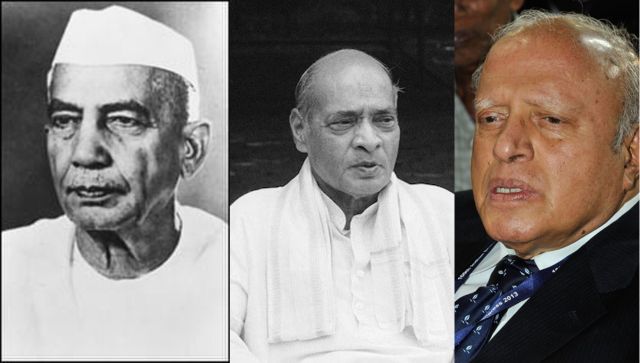New Delhi: Does the government’s involvement in the appointment of judges to higher courts pose a threat to the independence of the judiciary? This question is central to the ongoing debate over the National Judicial Appointments Commission (NJAC). The NDA government’s decision to replace the collegium system which has been in place since 1993, has left the legal fraternity somewhat divided.
A few members of the fraternity firmly believe the collegium system is “unconstitutional and anti-democratic” where judges are appointed through “secret soundings and cronyism” while others say that the government wants to “interfere” in the independence of the judiciary and it needs to be resisted.
The collegium comprises the Chief Justice of India, four senior most judges of the Supreme Court and the chief justice of a particular high court and its two senior most judges. The NJAC, which was brought into existence after inserting a new article (Article 124A) in the Constitution, consists the Chief Justice of India as ex-officio chairperson, two other senior judges of the Supreme Court, the Union Minister of Law and Justice and two eminent persons to be nominated by a committee consisting the Chief Justice of India, the Prime Minister, the Leader of Opposition in the Lok Sabha or where there is no such Leader of Opposition, then the Leader of the single largest Opposition party in Lok Sabha. The eminent persons shall be nominated for a period of three years and shall not be eligible for re-nomination.
At present, the Supreme Court is examining the constitutionality of the NJAC and has refused to accept the government’s demand that the matter be referred to a larger bench of 11 judges from the existing five-judge bench headed by Justice JS Khehar. The court has said the hearing of the case will “continue on merits”.
Justice VN Khare, former Chief Justice of India, says there is nothing bad with the existing system but accepts that there is scope for its improvement. “There is nothing bad with the collegium system. It is, in fact, superior to the NJAC in many ways. It will also be unfair to say that it is not transparent. But yes, it can be further improved by making it more transparent. One or two persons nominated by the President can be included in the selection committee,” he told Firstpost.
When asked who should be nominated, he says the President can nominate an ex-CJI or judge in the collegium. But he strictly says there should be “no say of politicians in the appointment of judges because usually, the government is the main opponent in the people’s cases and there is chances abuse of executive powers”.
He refused to accept the allegation of bias, favouritism and nepotism in the appointment of judges but accepted that there is corruption in judiciary. “I cannot claim that there is no corruption in the judiciary but its prevalence is negligible,” he added.
Adding that the government passed the NJAC Act in “undue haste and without consulting the judiciary”, Professor Faizan Mustafa, vice chancellor of NALSAR University of Law, Hyderabad, told Firstpost, “The independence of the judiciary is not the private right of judges; it is the right of citizens. Ultimately, judicial legitimacy rests on public confidence in the courts. Appointment of judges is seen as a crucial mechanism to achieve judicial independence. Judges must be independent of executive, senior judges and in their ideology.”
“The NJAC in its present form may not achieve these ideals,” he says arguing “We had the primacy of executive in the appointment of judges in the first four decades of our republic. Though most of the judges picked up under this system were independent, upright and fearless, at times the government did succeed in appointing several pliant and submissive judges.” He feared that the NJAC with Law minister as member may be used by the government in appointing judges of its choice. “Moreover, since the government is biggest litigator, it should not be allowed to cherry pick judges.”
There’s no clarity even on the two ‘eminent persons’ and the vagueness is deliberate, he said. “They are to be selected by the Prime Minister, the Leader of Opposition and the Chief Justice of India. One possibility is that two politicians would join hands and make the CJI’s opinion irrelevant as there is no mention that the selection should be unanimous or alternatively the CJI in the hope of becoming Lokpal, Governor or NHRC Chairman would join the Prime Minister and make the opinion of the Leader of Opposition insignificant”.
Advocate Shahid Ali, senior lawyer at the Delhi High Court, says the “attempt to interfere in the independence of judiciary through the NJAC will prove to be fatal for the democracy and detrimental for fundamental rights guaranteed in the Constitution”.
Advocate KC Mittal, former president of Delhi High Court Bar Association and ex-chairman of the Bar Council of Delhi, strongly opposes the collegium system but appears to be apprehensive about the future of the NJAC.
“After an extensive debate about the role and power of the judicial processes, the framers of Constitution never agreed to absolute power to the judiciary in matter of appointment of judges, leave aside the so-called innovative idea of collegium. The text of our solemn document is very clear and unambiguous,” he told Firstpost.
“Prior to 1993, the executive alone had the over-riding power to make the appointments in consultation with the judiciary. The names of aspirants to judgeship or recommendations thereto by the Chief Justice of a High Court would get examined in the closed system of the executive. It was not bound by the recommendations and was competent to take final decision,” he argues.
However, in the Supreme Court Advocates-on Record Association vs Union of India case, the nine-judge bench took over the power by judicial interpretation to introduce the collegium system and make recommendations binding on executive. Thus, the concept of “consultation” was judicially transformed into “concurrence”.
“The system introduced by the judgment as reinforced by 1998 reference to the Supreme Court has been practiced by the apex court and blindly followed by the government since then. The Constitution remains as it was before the 1993 verdict.
Interestingly, he says, the reaction of the bar then was positive as it thought that the removal of “evils” in the appointment of judges would lead more welcome reforms, which would take care of “massive complaints of nepotism, favouritism and even corruption”. “But soon, within a couple of years, disappointment with the system was creeping as the scenario did not change. Post 1993, the experience of two decades is that the system made by the judiciary proved to be no less worse than what was prevalent in the pre-collegium days.
The veteran lawyer alleged some compromise matrix works in recommending the names at the whim and fancies of each member of the collegium. “This is not gossip but truth filtering out of the experience and knowledge gathered over the years. Everyone connected with the administration of justice pontificates on the need to fill up vacancies but refuses to remove the basic causes affecting the process of appointment based on give-and-take. This pick-and-choose formula is disastrous as it undermines the creditability and veracity of collegium mechanism. To put it differently, the experiences have shown that those who have God Father in the higher ups make task easy and smooth to push the name(s), even get cleared by the IB (intelligence Bureau) to ultimately make appointment comfortably,” Mittal said.
He said people believe in evolution of the system but with the passage of time it becomes redundant. “When the executive-controlled system failed, the collegium came in. When collegium is now under shadow, we jumped to the NJAC but where is the guarantee that the new law would not go the same way? Is it humanly possible that six members of a supreme body will have firsthand knowledge of each and every candidate? They would ultimately depend either on hearsay or some source of their own. This again would be unscientific, irrational, unpractical and unworkable,” he said.


)




)
)
)
)
)
)
)
)